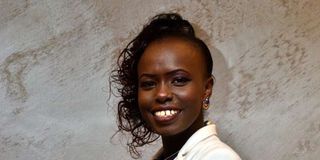Thinking about a career in STEM? Go for it!

Festo Didactic Account Manager Faith Chepkorir Langat poses for a picture at Nation Center on October 24, 2020.
What you need to know:
- Today’s youth are enduring tough times. Many have lost their jobs, others are holding low paying jobs and have many dependents, and this can be quite discouraging.
- I would advise them to be resilient, properly manage their time and resources, and to always strive to add value in their workplaces.
- We all make mistakes, but it is important to constantly rewrite our stories, and to find contentment in the little things.
BY COLLINS KARIUKI
Faith is a chemical engineer currently working at FESTO Didactic as the East Africa account manager. She also serves as the deputy technical delegate at WorldSkills Kenya.
What attracted you to the field of chemical and process engineering? It is all about my love for STEM (Science, Technology, Engineering and Mathematics) subjects, which was influenced by my parents who were maths and science teachers. Thanks to their inspiration and support, I performed so well in sciences, especially in chemistry. I used to write my chemistry papers with so much ease, and this led me to choose this career.
What exactly do you do? The company I work for is a leading provider of technical training equipment ranging from mechatronics, electrical engineering and automation. I manage its projects and dealers across East Africa. My job is to follow up on upcoming projects and to spearhead implementation of ongoing projects.
What is Worldskills and what is your role there? WorldSkills International is a global non-governmental organisation whose mission is to raise the profile and recognition of skilled individuals, and to show how important those skills are in achieving economic growth and personal success.
Kenya was recently ratified as the 84th member state, and WorldSkills Kenya’s key role will be to organise skills competitions from the county level to the global level and to run other projects aimed at improving skills excellence. My role is to offer them support in terms of planning and executing the projects.
So, what can you tell young people skills acquisition?
Today’s youth are enduring tough times. Many have lost their jobs, others are holding low paying jobs and have many dependents, and this can be quite discouraging. I would advise them to be resilient, properly manage their time and resources, and to always strive to add value in their workplaces. We all make mistakes, but it is important to constantly rewrite our stories, and to find contentment in the little things.
What do you mean by “adding value?”
The world is a vacuum. It does not create wealth, but gains value from our actions. Adding value is about giving your best in everything you do. Our goal should be to become multipliers of value, and to delight in giving more than we receive. If you are an entrepreneur, treat your clients with kindness. If you are employed, ensure that you perform your role to the best of your ability. Do not rely on external motivators like supervision or money.
If all courses are considered equal, why do you advocate for more girls to get into technical fields such as engineering?
Whereas I share in the belief that all courses are equal and are channels through which we can find meaning and purpose in life, I also believe that every course has a role and season in society. This is a season to develop STEM courses.
According to the World Economic Forum, the fourth industrial revolution is projected to create a wide range of new jobs in fields such as STEM, data analysis, computer science and engineering. Women should be inspired by these opportunities and with boldness pursue a career in these fields.
Many engineering students in Kenya usually end up working in other fields. How come?
Engineering is not an isolated course. It majorly equips us with general problem solving skills. Therefore, I believe that even if an engineer ends up working in a bank, they will still put their engineering skills to use. The other issue is that we live in an imperfect world, especially here in Africa where we are lagging behind in terms of innovation, manufacturing and have limited resources that prevents us from creating an environment where all trained engineers can practice. However, these challenges should not discourage anyone from joining this career. The future is in STEM.
Tell us about the Sub-Saharan Africa Leadership Programme…
The programme is being offered in Germany so apart from learning a new language and the German story of innovation, I have witnessed growth in my personal, social and professional life. The programme gave me the much needed exposure, validated my competence and greatly boosted my confidence. It also cultivated in me a culture of constant learning. I also learnt that different cultures affect our characters and how we conduct ourselves professionally.
Aside from work, what interests you?
Photography and cycling. When I was in Europe, photography was the only way I could share my experiences with my friends and family. My son’s love for cycling rubbed off on me and I took it up as a hobby. It was quite humbling to learn how to cycle as an adult and even to fall off the bike in front of my children! But they cheered me on and motivated me to keep going.





